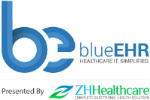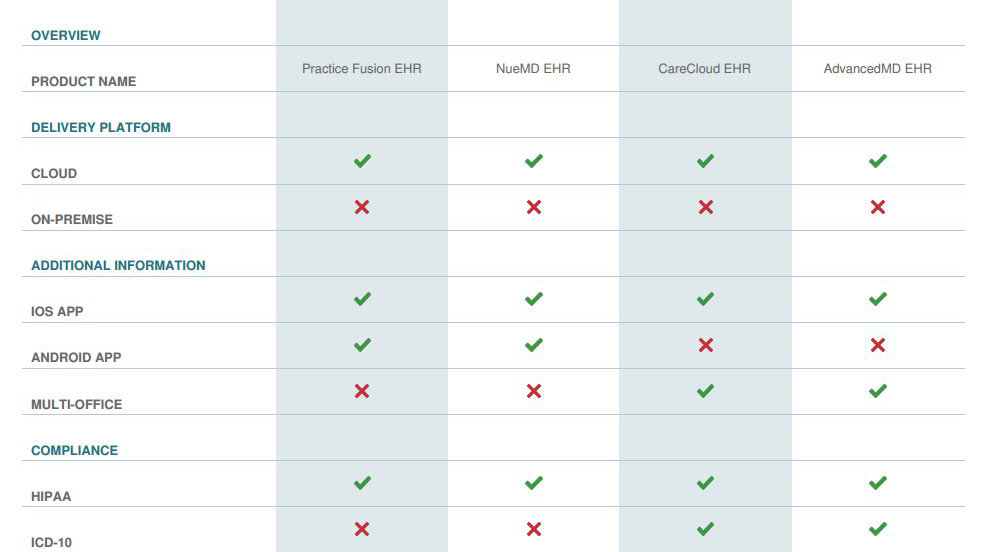Cardiology EHR Buyers' Guide
Cardiology practices operate in an environment that leaves little room for error, both from a clinical perspective and from an operational standpoint.
In this difficult environment, a specialty EMR software for cardiology can be an effective tool to enhance the quality of care your practice offers, and provide a way for practices to better manage their finances.
In order to fully realize these benefits, you'll need to select a cardiology EHR which is a good fit for your practices needs, identify the features you want, and budget for it accordingly.
That's why we've put together this guide. We'll help you understand:
- What your practice's requirements are for a cardiology EHR
- Which cardiology EHR features to look for
- How much cardiology EHR costs
- Which cardiology EHR vendors to consider
What are your requirements for a cardiology EHR?
The foundation of cardiology practice rests on the ability to collect data from medical devices, input a diverse range of clinical data collected from the patient by clinicians, monitor patient safety regarding medications and be able to manage the unique array of billing codes cardiology practices must manage. An effective cardiology EHR serves as the primary tool for meeting these requirements.
Use our selection checklist to kick off your requirements gathering process
In effect, a cardiology EMR should serve as a conduit to channel clinical data, provide a way to enhance clinical effectiveness and safety and, if needed, provide a way to manage the business side of the practice.
Which features shoud you look for in a cardiology EHR?
There are numerous EHR features that can help you meet the requirements listed above. Some are available in most systems; others are specific to cardiology-oriented EHRs.
Below, we focus on cardiology-specific feature sets that you won’t find in more general EHR systems.
Integration with diagnostic instruments
Cardiology relies heavily on diagnostic instruments that can conduct a range of testing and monitoring functions. An EHR software for cardiology should seamlessly integrate data from EKG/ECG, interface with large national labs, and also integrate EHR with cardiology PACS and other diagnostic instruments into the patient’s records. Beyond collecting onsite medical device data, an EHR for cardiology should also be able to retrieve and store offsite diagnostic imaging in the patient’s record.
Cardiac procedure coding
An EHR for cardiology should allow a practice to translate procedure codes into billing documents. Given the wide array of codes associated with cardiac procedures, an EHR with this functionality facilitates data entry and also reduces the risk of coding errors, which can result in lost revenue arising from denied claims.
Cardiology-specific drug monitoring
Cardiology patients not only require medications for treatment, but also are at a risk for adverse drug interactions with both prescribed and over-the-counter medications. As such, a cardiology EHR should offer a way for clinicians to access a cardiology-specific drug database to check for adverse drug interactions and suggest appropriate medications.
Facilitation of cardiology-specific data entry
An EHR software for cardiology practices should offer specific cardiology EMR templates that facilitate entering point of care data, like palpitations, auscultating, heart sounds, and pulse. Further, a cardiology EHR should offer customizable template functionality, allowing the input of the following clinical data which a cardiology practice may encounter while treating patients:
- Hypertension
- Cardiac exams
- Cardiac Cath
- Pacemaker data
- Cardiology-specific ICD/CPT codes
- Cardiology SOAP notes
The cardiology EHR features outlined represent general considerations a cardiology practice will likely use while selecting an EHR. One should view these requirements and features as a baseline feature set, which can be expanded on depending on the extent of other practice requirements.
How much does cardiology EHR cost?
The cost of cardiology software varies based on the level of functionalities and the method of deployment. It’s difficult to obtain specialty-specific figures, so this is a difficult question to answer outright.
That said, general figures provide a good starting point for budgetary calculations. Consider that:
- A typical multi-physician practice could spend about $162,000 to implement an EHR, with $85,500 for first-year maintenance costs
- The cost of purchasing and installing an EHR is estimated at $6,000
Bear in mind that a cardiology EMR may verge towards the upper end of this scale, particularly if you want advanced, specialty-specific features or want to customize a general EHR to suit your practice needs.
If you’re looking for some examples of base rate prices for cardiology EHR, here are a couple of examples from our EHR pricing guide. Remember that these are out-of-box prices only; you’ll need to add implementation costs (consultancy, training, data migration) and ongoing support and maintenance fees to get a true representation of how much new software will cost.
- CareCloud Central: $349 per provider/month
- CureMD: $295 per provider/month
- ElationHealth: $349 per provider/month
Which cardiology EHR vendors should you consider?
The market for cardiology EHRs is populated with vendors who serve both the specialty EHR and general EHR markets, and the products reviewed here contain a mix of both types.
This isn’t a definitive list - different EHRs suit different practices - but a base from which to build a more extensive vendor shortlist.
athenahealth: athena Cardiology EHR
athenahealth cardiology EHR provides cloud-based services with integrated revenue cycle management, medical billing, patient engagement, care coordination, and population health management, as well as Epocrates and other point-of-care mobile apps.
Athena’s system allows providers to report on quality, track clinical guideline compliance, establish practice benchmarks, and generate a wide variety of patient reports. In line with its mission of focusing on data-driven quality improvement, the EHR allows providers to access the best practices of over 80,000 providers, quality rules, and industry guidelines.
Epic: EMR for Cardiology (Cupid)
Epic’s cardiology EHR offering, known as Cupid, is a cloud-based EHR that offers a standard EHR with integrated order entry, scheduling, procedure documentation and structured reporting for cardiology. The system also offers data analytics.
Cupid also supports a wide range of workflows including Echocardiograms, Ultrasound vascular, Cardiac Cath, stress testing, Electrophysiology, and structured documentation. The system also provides an intuitive array of interactive diagrams of coronary arteries and interventions as well as diagrams for wall motion.
IBM: Merge Cardio EHR
Merge Cardio is a web-based cardiology EHR that was recently ranked #1 in the KLAS in cardiology rankings. The web-based platform provides users with a single web-based view of a patient’s complete record from all cardiology modalities, and access to simplified reporting tools. The system also provides interoperable image exchange and integrates data from different sites and sources to create a comprehensive digital record. The seamless flow of data across the system allows for the elimination of data silos by using one single point of entry to a complete cardio record.












